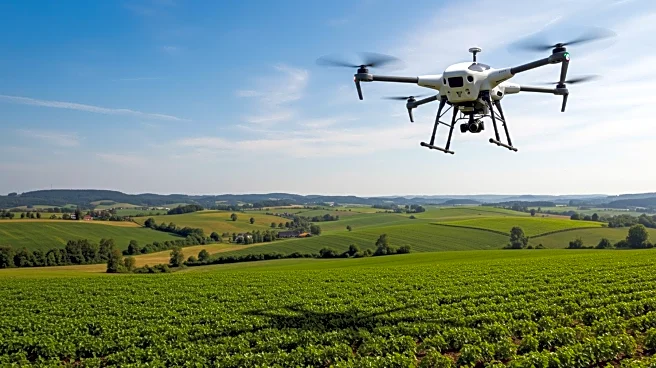What's Happening?
The AI in precision agriculture market is experiencing significant growth, driven by the integration of advanced technologies such as machine learning, predictive analytics, and remote sensing. These technologies are being used to optimize crop production and resource utilization, providing real-time insights into soil conditions, weather patterns, and crop health. This allows farmers to make informed decisions that enhance productivity, reduce operational costs, and support sustainability. The market is projected to grow from USD 776 million in 2024 to USD 4755 million by 2034, with a compound annual growth rate (CAGR) of 20%. Key players in the market include IBM Corporation, Microsoft Corporation, and John Deere, among others.
Why It's Important?
The adoption of AI in precision agriculture is crucial for addressing global food demand and optimizing resource utilization. By enabling data-driven decision-making, AI technologies help in precise irrigation, fertilization, and pest management, which are essential for sustainable farming practices. The integration of AI with IoT devices and sensor technologies enhances farm monitoring and management, contributing to overall agricultural efficiency. This technological shift is expected to drive a modern green revolution, ensuring consistent food production despite environmental challenges. The market expansion is further supported by government policies and financial incentives promoting smart agriculture.
What's Next?
The AI in precision agriculture market is poised for continued growth, with North America expected to maintain a leading position due to its advanced technological infrastructure and high adoption rates. Europe is also witnessing strong growth, driven by investments in AI and digital farming technologies. Challenges such as high initial investment costs, data privacy concerns, and regulatory uncertainties need to be addressed to facilitate wider adoption. Future developments may include increased interoperability among AI platforms and agricultural machinery, as well as improved internet connectivity in rural areas.
Beyond the Headlines
The integration of AI in agriculture not only enhances productivity but also promotes environmentally responsible farming practices. This shift towards digital agriculture could lead to long-term sustainability in food production, reducing the environmental impact of traditional farming methods. Ethical considerations regarding data privacy and cybersecurity will need to be addressed as AI technologies become more prevalent in the agricultural sector.









